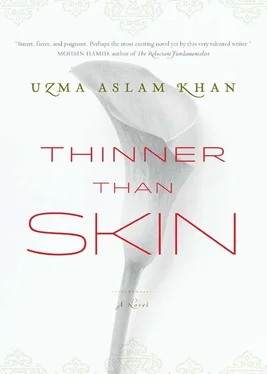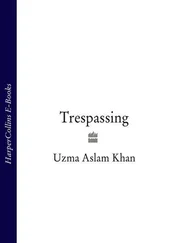“There are those who are walking toward a wall,” he kept on. “All we have to do is drive them forward. All we have to do is escort them. And you, Maryam, all you have to do is will it. Your mother would have done no less. And you are your mother’s child. As Kiran is yours. I am the legs, but you are the will.”
Aside from his finger, she had never touched him. Nor had she pulled the flesh around his knuckles with her tongue and teeth for the garlic tint of honey even once since her marriage. Nor would she.
She walked him to the curtain.
While stepping outside, he turned back to face her, and she saw that both the fear and the honey were gone. “They ride under the open skies, Maryam, these men and women of the steppe. Just as we do. And, like us, they are not foolish enough to point at the sun or the moon or the stars. They do not point at what gives them life. They only point at what takes it away.”
She held his gaze. If he took her hand now she might not pull away.
“This morning I looked at loi tara with your eyes, Maryam. I also looked up at girgiti. You are not waking up early, your husband tells me. You are in too much pain. So I looked at those six stars in your place, and in Kiran’s place. Six stars, for her six years. What did they want with her, those people who know nothing of our stars?”
When he left, Maryam nailed the curtain shut. Then she fell to her knees.
She let it come, the animal sounds that lunged from her throat with more anguish than a horse impaled on a fence. There was a puncture wound to her chest, and no amount of pressure with her palm — or smacking, or beating — could stop the bleeding. It seemed only one thought might begin to offer some relief, to fill the hole widening inside her breath. The thought was this. The part of her she had lost — and kept on losing, every hour of every day, it never stopped, the hole was growing so big , despite how fast she filled it with this thought — this part of her wanted him, Ghafoor, to do the worst thing his hard friends from the north had taught him. The absolute worst. She smacked the heel of her palm against the dirt floor — oh, this was relief! The way the wrist began to give ! Again! Again! — she would go to the shrine this evening — May the goddess be with her! May the horns of her bulls clap their consent! — she would sacrifice a lamb and her wrist — Again! Again! — she would pray for the worst, the worst, the worst.
Blessed Are the Outsiders
I was beginning to wonder if this was a mistake. Perhaps Irfan had been right. From Kaghan we ought to have headed south, not north. My doubt stemmed from a series of events encountered after our stop at the glacier, each causing further delays.
First, soon after crossing Babusar Pass, our jeep broke down and we ended up staying at a hotel. Once again Irfan and I shared a room. I slept poorly and each time I awoke, instead of Irfan, I saw Farhana lying beside me. In the morning, Wes informed us that Farhana was unwell. It was commonly known that the gas pressure at these heights was too low for boiling lentils, yet she’d ordered them the previous night and of course had spent it running to the toilet. According to Irfan the delay was necessary for a third reason, something to do with the “indemnity” agreed to with Maryam’s family. When I asked to know more, he said “we’re waiting for someone,” and returned to his phone.
So we waited. The town we were stuck in afforded a glimpse of the real Naked Mountain, whose phantom lookalike we’d seen from the lake. There he loomed, shimmering at 8,126 meters, a bold and cocky devil also known as Killer Mountain. He’d killed thirty-one climbers before finally conceding to one man at his summit; he’d killed another thirty-one since. I wondered about the Queen’s melt, down below. I wondered how the lake appeared today.
We finally left the next morning, in another jeep, with a different driver. Beside me, Irfan remained edgy, while beside him, Farhana reclined in the seat, sweating and pale. Despite her weakness, I thought I saw a smile lurking around her mouth. She seemed to be the only one who felt us advancing forward. Leave it behind was to be the essence of any truce between us, and we all seemed to understand this, even if we didn’t all agree. As we ascended higher into the mountains, wheeling the Frontier firmly to our backs, it was as if we were the ones standing still while the edge of the world flew by. We were on the Karakoram Highway, a stretch of road that cut through the tallest peaks, creating passes within passes, rolling in conjunction with the Indus River that carved the gorges dropping inches from our jeep. I attempted a smile. Yes, we can rise above our mistakes! I doubt the smile or the sentiment would have convinced even a goat.
For starters, she and I could be sharing a room.
But I wasn’t going to dwell on that now.
The mountain was following us. If at one bend he disappeared, at the next, he rose again. Naked Mountain, swaggering flame of Queen of the Mountains. The mountain that had cursed us at the lake. The mountain that moved. To bid him farewell, as though we needed his blessings to go on, after a few kilometers we left the jeep again, though we had only just piled in. Below us raged the dark, silty Indus; above, a thin necklace of purple-gray clouds. There was a rumbling in the distance as we followed Irfan and Nur Shah, the new driver, toward a cluster of rocks.
The rocks were scratched with inscriptions of horses, as on the graves in Kaghan, and with a nimbus of winged figures — fairies, perhaps, or, according to Nur Shah, shamans. His fingerprints mixing with those who came before him, he also decoded battle scenes left by warriors from the steppe, incense bowls scratched by Buddhist monks, and, a few feet away, an ancient script. Thousands of codes were said to remain hidden in the rocks, perhaps meant for those who’d yet to cross the mountains or ford the Indus, in which the people of Chilas had at one time ridden dinghies, panning for gold.
“There is no gold left,” concluded Nur Shah, turning away from the glyphs to view the west face of Nanga Parbat, as he pierced and shredded his crown of clouds. Perhaps it was only the altitude, but I was suddenly incapable of gauging where I stood in relation to him — forward or backward, west or east? I shook my head to clear it.
“What happened here?” said Wes, turning back to the glyphs.
In my vertiginous state, the glyphs were a welcome anchor. The floating in the sky — or in my head — began to still. I realized that the figure scratched on the rock before me had been defaced.
Nur Shah’s face drooped as he shook his head. “You know the times. People think if you draw a new line across an old one, you can remake the past.”
“We’ll lose even more glyphs to China’s development projects than to mad men crying jihad,” said Irfan. And the three of them talked about the plan to expand this road and connect it all the way to the deep-sea port of Gwadar on Pakistan’s southern coast, the construction of which was largely funded by China. The Chinese premier had even inaugurated the opening of the port this spring. The extended road would secure China’s trade route from Central Asia down to Gwadar and on to the rest of the world.
“Some believe it will give us work. But when the work is done?” lamented Nur Shah. “What will become of us, without our homes? Without our past?”
The clouds were now at Naked Mountain’s waist, like a belt. Farhana looked up as the belt began to peel away. “Let’s go,” she said.
“Not yet,” Irfan replied.
“What are we waiting for?”
“Him.”
A motorcycle halted beside our jeep, and a figure rolled off the seat with a bag swung over his shoulder.
Читать дальше












